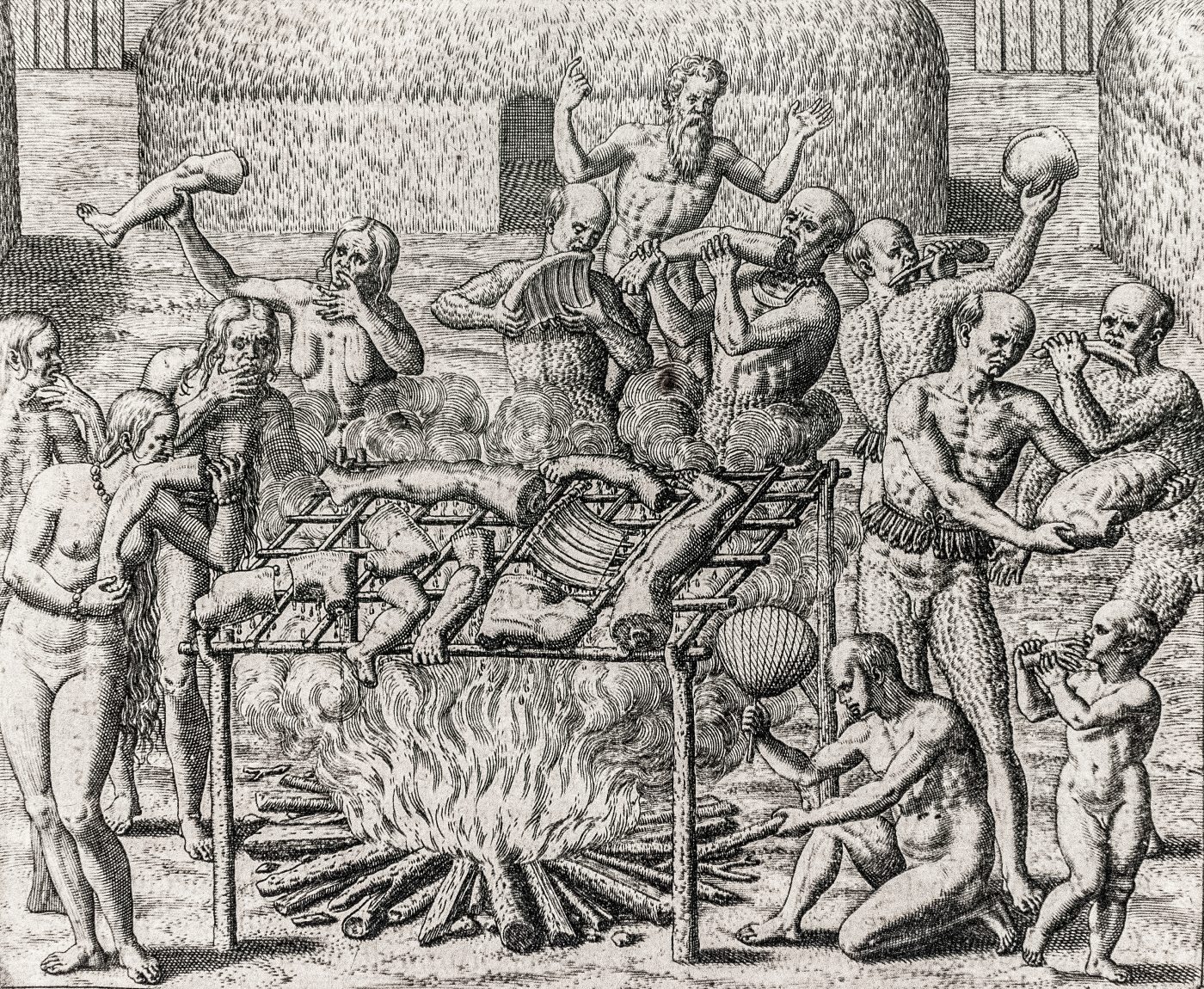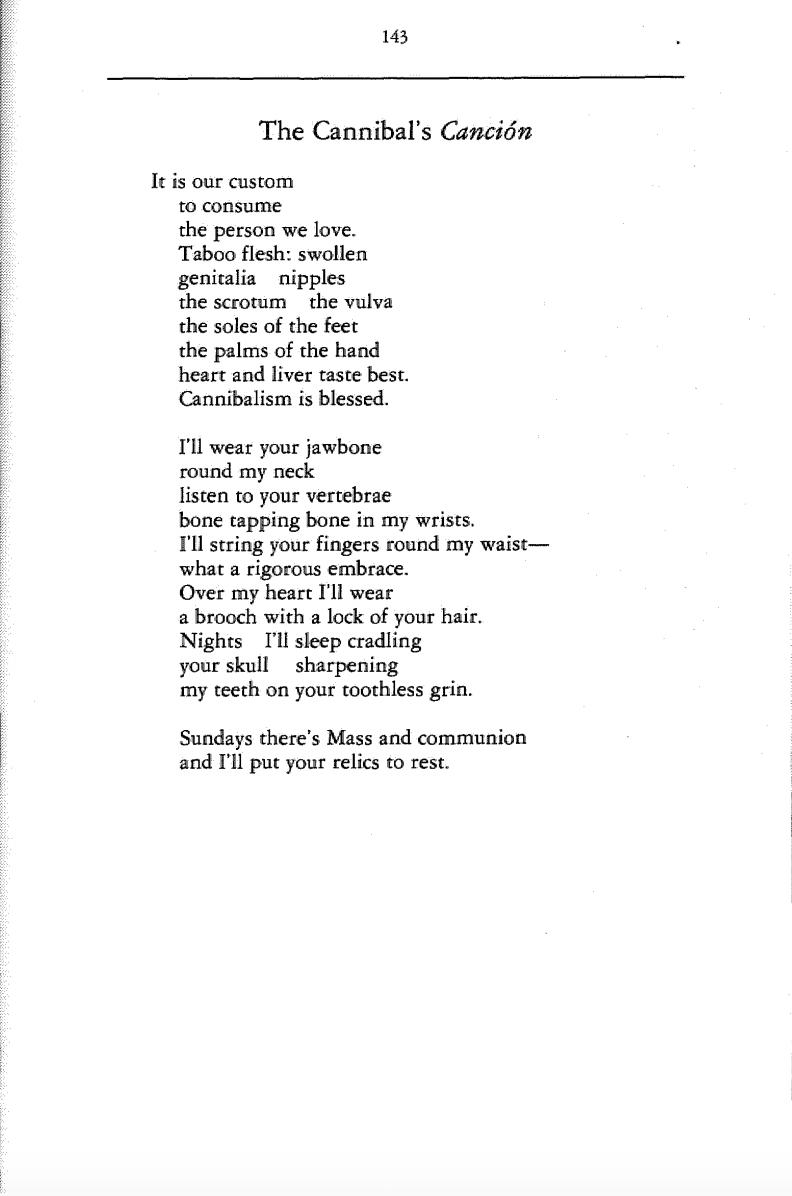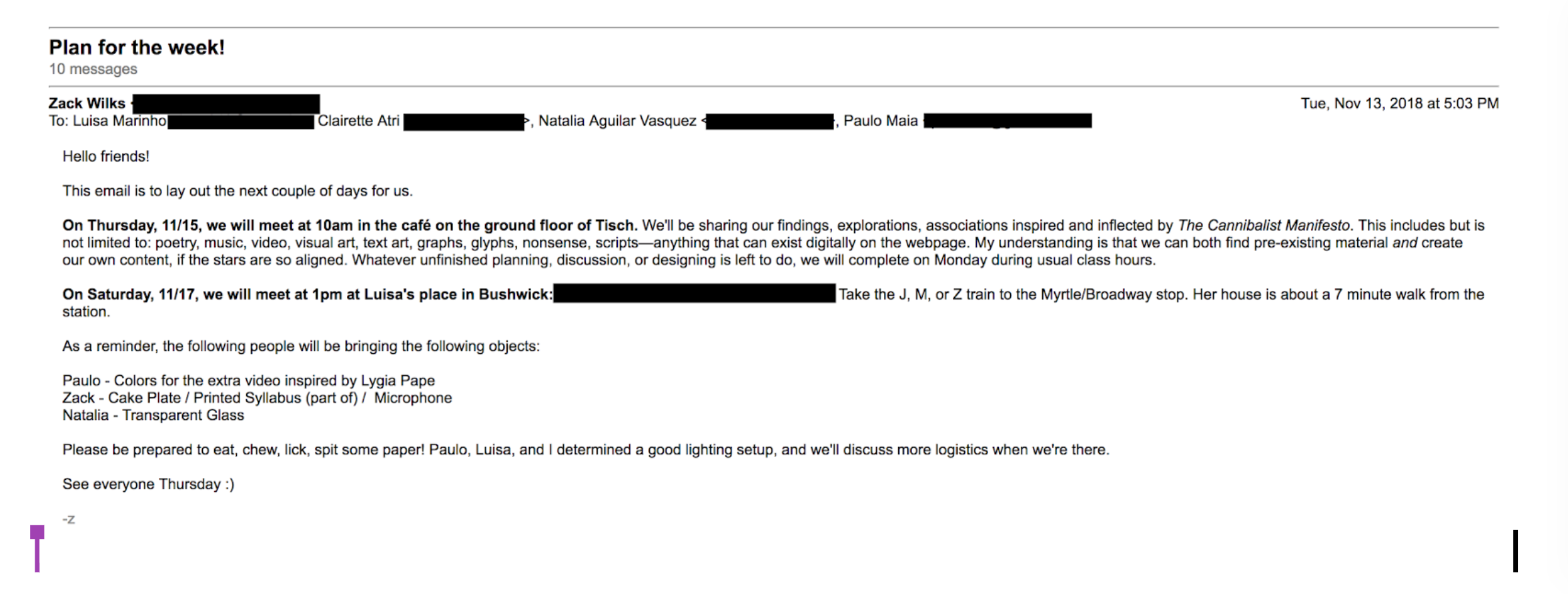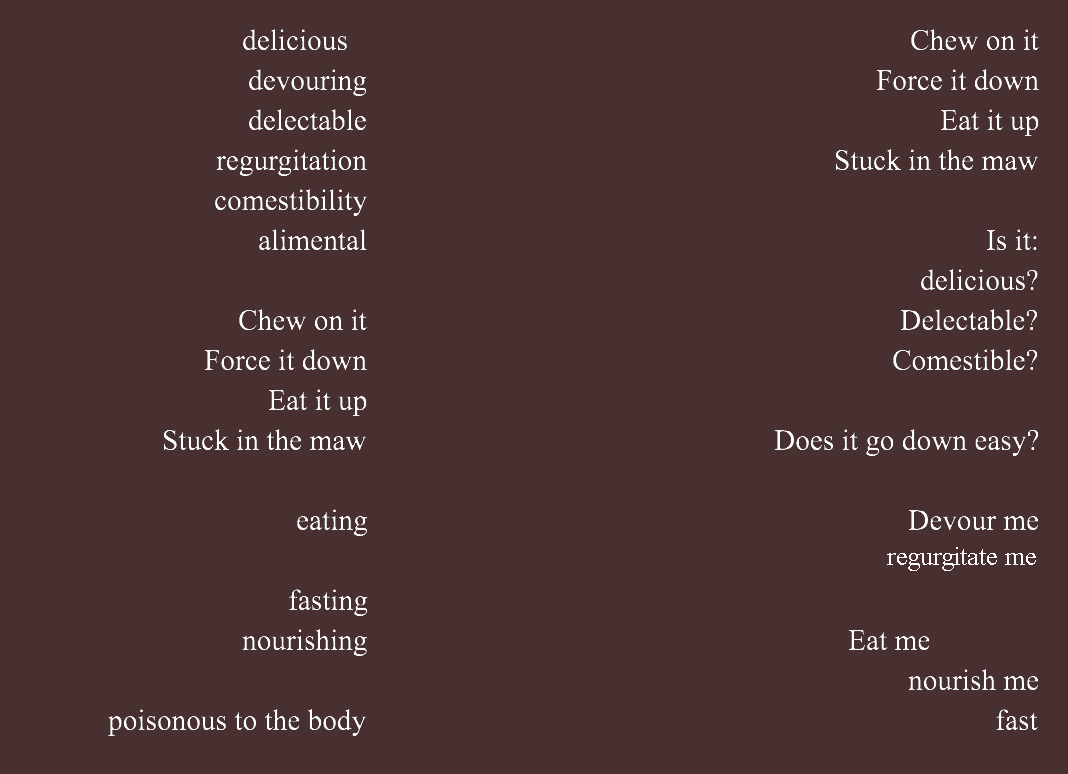A time to eat, an invitation, an approach, an assignment, a different taste, another assignment, the eaten eating, a final assignment
¿Qué hacía el domingo a las 11.14 horas?
Despertar.
¿A qué?
¿Qué exactamente comía?
Tragaba mucho…
A veces con té de manzanilla para mitigar el dolor de panza.
¿Qué consumía exactamente?. Coopere, por favor.
Dependía
¿De qué?
Dependía de qué se necesitaba tragar.
Prosiga, por favor.
Había que metérselo, no daba tiempo, pero yo tragaba…
hacía buches de saliva antes de que entrara para que resbalara mejor, para que pasara. Luego me quedaba la boca seca. Toda seca. No podía hablar por horas, pronunciar palabra alguna. Seca. ¿Has visto una boca seca de tanto tragar?
No se desvíe por favor. No me ha dicho a quién… digo, qué comía.
Ya le dije que dependía
Usted comía… alguna vez… se nos ha informado que su caso está vinculado con prácticas …
Papel, señor. Tragaba papel y después vomitaba.
A las 3:04 pm me metía a bañar, sin poder hablar, en silencio, seca.

A TIME TO EAT.
A pleasant simple habitual and tyrannical and authorised and educated and resumed and articulate separation. This is not tardy.
– Gertrude Stein, Tender Buttons
A few months back there was a brief moment of tension when, as we were about to begin class, Diana looked around the seminar room and asked us, “What’s wrong here?” We weren’t all at the table. More than a formal intervention, Diana’s question was a call to show up, to be-with, or, as she might put it, to be ¡Presente! The table, then, becomes the ground for such relations, a technology of dialogue, dispute, and—hopefully—learning. It is a useful pedagogical, political organizing, and collaboration tool; a thing that necessarily asks: Who gets a seat at the table? Who is excluded? What kinds of performances occur at the table—ones which reproduce normativity or ones which imagine antinormative performances of self, relationality, politics, pedagogy, and alimentarity?
The title of our project, Sobremesa Pedagogy: A Roundtable on the Feast, plays with the concept of the roundtable as both academic practice and relational grounding. The academic roundtable imagines itself as toppling the verticality of the lectern; participants sit at the front and have a discussion with each other, as opposed to a single person facing front and speaking, as in the conventional lecture. Spectators watch and listen as voices sound, trail off, resonate, or fall politically and affectively flat. While the roundtable posits a horizontal relation amongst invited participants, it does not necessarily do so for spectators, whose only chance to lend their voices is during the Q&A session following the discussion (time permitting). Lois Weaver’s The Long Table, in which all who are present have the chance to sit and speak at the table, may be closest to modelling the radical horizontality the academic roundtable proposes. That said, this project does not attempt recreate such environments; rather, it attends to the sticky surplus, that something-more, thrumming in the din of table talk. Yes, it plays with the idea of the academic roundtable in its dialogical mode, but it also takes the table, quite simply, as a place to eat.
We site our own project at and on the table for a number of reasons.
As a social object, it scripts performances of commensality—the practice of eating together. Etymologically, commensality comes from the Latin com, sharing, and mensa, table. Immediately we enter into a space operating within the logic of relationality and the gift economy, a space where conversation, dialogue, disagreement, and ruptures seem to spring forth. But, this is not without an attuned critical optic. The table can be where normativity is reproduced; think, for example, of the dynamics of the nuclear family. The father sits at the head, restaging the paterfamilias, or the paternal sovereign in Roman law. Such staging reinscribes repressive political patriarchy writ small, squeezed into the domestic sphere. Meanwhile, the children are asked to sit still and perform restraint. Mother, or domestic workers—usually women of color—or, in the eighteenth and nineteenth centuries, black slaves, set the table, cook and serve the meal, and clean up afterwards. We would like to highlight that this is a particularly middle and upper-class imagination of what such performances look like. Contemporary performances of commensality are thus inextricable from violent and exploitative histories of colonialism, the transatlantic slave trade, transnational migration, global capitalism, and patriarchy.
The table we imagine cannot undo these violences, but recognizes that these histories haunt contemporary scenes of the quotidian. Like Sara Ahmed in Queer Phenomenology: Orientations, Objects, Others, we attempt to orient ourselves towards the quiet labor and indelible histories that structure the conditions of possibility for the apprehension of what presently presents itself to us.
With the above in mind, the table we imagine is round, a horizontal plane which disrupts the spatial dominance of the head. Our roundtable is one where knowledge is on the table to be talked over, picked at, chewed, spat out, swallowed, forced down, eaten up, reviled, revered. It is also one where we put ourselves on the table. That is, as Viveiros de Castro has demonstrated, we recognize that the ongoing project of becoming is one in which we constantly eat the other and allow the other to eat us. That other may be a text, a teacher, a fellow student, a friend, a lover, or an enemy.
Eating the enemy is not a way to “assimilate him,” to make him just like me, or to “deny him” affirmation and the substance of an “I”: neither to transform myself into him as in another “I,” nor to mimic him. On the contrary, it is to transform through him—to transform himself into an Other Self, to self-transfigure with the help of the “contrary” (thus the old chroniclers translated the word Tupinambá into “enemy”). This is not to see myself in the other, but to see the other in itself. In short, identity “in reverse”—an alternative to identity.
The practice and process of pedagogy, which also epistemologically structures subject formation, is alimentary. To eat the other is not to destroy the other. Rather, it is to take other inside of you, to incorporate, to reconstitute, to metabolize, and ultimately to excrete or bring the other back out into the world in some manner. What is eaten does not cease to exist; it lives in you. Such an understanding of pedagogy recognizes the queerly generative force of desire, sexuality, and pain—as well as affects such as hope, fear, frustration, and joy—in the educative moment. Borrowing Kyla Wazana Tompkins’s concept of queer alimentarity, which “signal[s] the alignment between oral pleasure and other forms of nonnormative desire,” Sobremesa Pedagogy polyvalently performs a pedagogy unbound to disciplinary or formal strictures, instead inviting its audience to lick, spit, swallow, desire, or reject our imagined mode of knowledge production. This is not a prescriptive program. It is an invitation to experiment with us.
We suggest alimentarity is a useful heuristic and practice for a decolonial pedagogy, one which both enacts and is critical of The Cannibalist Manifesto; one which imagines a varied, nourishing textual diet; one attentive to both self and other without being locked into stultifying and toxic colonial performances of propriety and antirelationality masquerading as connection, or what Gerald Vizenor calls “manifest manners.”
For us, this project manifested in the messy aftermath—the Sobremesa—of our own alimentary performance of pedagogy. As such, it situates itself at and on the table during the suspended time of the Sobremesa. We experience this lingering as a complementary counterpoint, or perhaps a balancing flavor, to Diana Taylor’s notion of a peripatetic or walking theory/pedagogy. Maybe, movement, process, and praxis can reside in the longue durée marking the meal’s refusal to end. The beats of metronymic clock-time plod on, but we can’t hear it over each other’s voices, over the conversation we must have, right now.

an invitation:
Poets have strange eating habits
– Gloria Anzaldúa
Eating threatened the foundational fantasy of a contained autonomous self—the “free” Liberal self—because, as a function of its basic mechanics, eating transcended the gap between self and other, blurring the line between subject and object as food turned into tissue, muscle, and nerve and then provided the energy that drives them all.
– Kyla Wazana Tompkins
It begins with the mouth, with desire. And it takes us to the first cooked meal in the caves, the apple in the Garden of Eden. The Verb. The West declared authority over “knowledge” and built the Academy using bricks made of grammar. They said, “This is the language.” But they left out the tongue.
This project imagines a pedagogical future that attends to, and lives through, the body. This is not without critical understanding of how pedagogical practices act to reproduce colonial ways of being: i.e., limited methodologies that maintain heteronormative, racist, individual, and selfish ways of learning and teaching. We see pedagogy, and the state apparatuses administrating Education, as a particularly pervasive locus of oppression, one which, as it dominantly functions, works to violently fold difference into the same and reproduce the “impoverished and toxic” status quo of the here and now. Put another way, and attending to the West’s violent attempts to educate out of existence indigenous, black, brown, queer, working class—and so on—lifeworlds, our moment is still dominated by colonial pedagogy. But, these lifeworlds cannot be contained within the stultifying conceptual categories that limit relational imaginations and decolonial futures. We mark and illuminate the refusal to operate within the progressive discourses of normative pedagogy and straight time, of living solely to enter and “succeed” in the academy and workforce, of seeing others as obstacles to our own individual ascent. This refusal is a break from the normative, a delicious opening in which we can taste a new pedagogy, a new way of becoming.
We propose to build and enact a roundtable in that opening, working towards a more inclusive and accessible pedagogy that considers the table a stage for mutual nurturing and feedback. We are interested in both eating (the physical, psychical, and epistemological act of taking something into the body) and commensality (the relational practice of eating together). Basically, the ways in which food functions as an occasion for dialogical relationality, or what Paulo Freire calls the “pedagogy of the oppressed, […] a humanist and libertarian pedagogy.”
For us, this performative mode of learning generates an affective and relational surplus which we work through metonymically; the part for the whole and the whole for the part. Your body for mine; our bodies for the whole. Of performance’s metonymic economy, Peggy Phelan writes: “In moving from the grammar of words to the grammar of the body, one moves from the realm of metaphor to the realm of metonymy. […] Metaphor works to secure a vertical hierarchy of value and is reproductive; it works by erasing dissimilarity and negating difference; it turns two into one. Metonymy is additive and associative; it works to secure a horizontal axis of contiguity and displacement.” For us, the table potentializes such horizontality.
We come to the table and set ourselves on it, eating (each other) to the bone. Welcome to the party of the senses! “This is a feast of words.”
We call for a modality of relation that attends to the messy, viscous, sonorous experience of the body in the throes of learning. What we’ve learned with de Andrade, Viveiros de Castro, Pape, Anzaldúa, Tompkins, and others, is that, transformative or not, pedagogy is alimentary. The means by which we eat up and with the other—which may be a book, a maxim, a pledge of allegiance, a mentor, a guide, a lover, an enemy—is a cyclical if at times asymmetrical process of incorporation and excretion. We invite you, then, to stay for the Sobremesa.
We are at our grandmother’s house, it’s Sunday, and we just finished eating. But we don’t move, our bodies are heavy, processing the meal, metabolizing the nutrients. We stare at the dirty, empty plates. “Would you like some coffee?” The learning starts there, as a double absorption of food and food-for-thought. That is the Sobremesa, an in-between space where we get what we need, and we offer ourselves to others, and they eat us. The other satiates me, your body for mine, our bodies for the whole.
The Sobremesa is a Spanish tradition. After dinner, and without clearing the table, the diners remain to talk, share, and pick at leftovers. The informal chatter after the meal can last for hours. It is a space for dialogue, yes, but also music, poetry and, of course, learning. The Sobremesa is the held suspension after the meal, a temporal not-here and not-there lingering in the relational space the meal-proper opened up.
It is important to acknowledge that Sobremesa is a colonial import from Spain, subsequently adopted in some countries in Latin America as a socialization and community-building ritual. Our here aim is not to reinscribe coloniality, but to devour and reconstitute the practice of Sobremesa through bodily alchemy.
Every meeting we had as a group happened as a Sobremesa. Conversations would take hours; everyone’s voice was there, sometimes one at a time, other times speaking over the other in generative conflict and disagreement. Hopefully, despite the formal limitations of the platform mediating this project, you’ll hear the polyvalent voicings and personalities sounding in these meditations on decolonial pedagogy. Please, sit with us.
We call all the cannibals of the world! Join us in our binge eating. This is a ritual of transformation, of deglutition, of collective de-colonization. It is a mutual ritual of global trajectories and communal learning.
We’ve been fed, but we have not been nourished. That is, we’ve been fed words, but we are done settling for the settler language lining the lineaments of our thought, fixing us into static being.
For centuries, we’ve opened our mouth and let you inside. You took a look at us and spooned words on our tongue. A furtive cringe. A dim grin. Our mouth is filled with these words. Our mouth is these words. Our tongue can only make certain shapes, can only taste certain tastes: diversity, multiculturalism, policy, governance, progress. In a word, a relatively new one for us, coloniality, “a term that encompasses the transhistoric expansion of colonial domination and the perpetuation of its effects in contemporary times.” Meaning awaits us when we arrive at the table, a “medium of exchange” and for you, a technology of transaction, a positivist concatenation, a fixed incantation, banality violently flicking through your, and our, rigorously choreographed tongues.

an approach:
A flickering light. An equation. A sheet of lined paper and a voice from the front, emptying trimmed knowledge into our mouths so we can regurgitate it right back. We take this normative model of education to be not just a tease but a fundamental violence; we arrive at the table hungry for knowledge, to uncover and feel through the meaning of things, but instead we’re rendered empty containers waiting to be filled—an epistemological deposit or what Freire calls the “banking concept” of oppressive pedagogy—an ossification of potentialities into rigidity, meaning death. And what does this look like? A West that is Center; a philosophical lineage that continues to rehearse and enact the arguments of a man who says, “The inferiority of these individuals [Amerindians] is entirely evident”; epistemicide, or the pedagogy that destroys life; a mind distinct from a body; a teacher distant from a student; a national holiday named after the originary architect of genocide and plunder in the Americas; a silo; a set place and colonial etiquette; a flickering light and a voice from the front.
Education, as it operates in coloniality, is one of the edifying arms of capitalism. It is born in the construction and silencing of difference, in the constitution of alterity as dissidence. It is structured through the domestication of bodies—Bible and bullet. Education in the Americas was designed to prime Catholic desires for expansion. But we were never baptized.
This structure of knowledge, which teaches us to swallow without chewing, may even fill our belly. But it does not kill the hunger. The ideas we are fed are filled with the same cowardice that ran through Hans Staden’s veins. The explorer, captured by the Tupinambas Indians, so feared being devoured that his panic contaminated his flesh. His body lost the value of good food.
Around this table, normativity is reproduced. Around this table, we are reduced. Which is to say: to reproduce normativity is to reduce life.
COMER SABIENDO QUE SE COME; SABIENDO QUÉ SE COME
“<<Piensas para conocer. Ni siquiera conoces tu pensamiento>>, había escrito.”
-Edmond Jabes
La única manera de saberse nutridos, comidos, comiendo, es saber qué se come. Y por eso pregunto: y, tú, ¿qué comes? What is that that goes down? What goes down?
an assignment:
Read The Cannibalist Manifesto, pick one aphorism that is interested in you, and create a critical/artistic response to it.
A DIFFERENT TASTE
“I came into this world anxious to uncover the meaning of things, my soul desirous to be at the origin of the world, and here I am an object among other objects.”
– Frantz Fanon
We’re anxious—as in, we’re eager—but at this table we end up giving off the affect you’re giving us, anxiety, that pointless adrenaline rush, that lack of appetite, that embalmed desire for homeostasis, for static normalcy. We desire a new desire, to be at the origin of the world together in a “communism of incommensurability,” popping new kernels of new meanings then popping that good shit right into our mouths. We desire to lick the shimmering lips of new knowledges, cook something (up) together, eat (each other) out and in, permit ourselves repulsion, and lean into the orificiality foundational to it all. But here we are, objects among other objects. We come to the table with meanings already on it, on us, but not of us, so we put our own meanings on the table, and we put ourselves on the table.
If at prior tables dialogue was impossible,
if we ate only what you put into our mouths,
if you didn’t eat us,
if we didn’t eat you,
then here we invite the impossible:
a love,
a dispute,
a comestible relation that revels
in imaginary, alimentary, and queer vibration.
Comer para callar: How to tame a wild tongue? Así, tragando, atragantándose. Para no decir, para no saber salvo lo que se traga. Y, ¿qué se sabe?
What we can learn from the Amerindian shamanic way of life, with those individuals who cross species boundaries, that is, from a variety of perspectives? Can we “take on the role of active interlocutors in trans-specific dialogue“? Let’s color the bibliography with references outside the canon. We live in the process. We’re living the process. We understand the power of collective creation.
“The indigenous world does not conceive of history as linear; the past- future is contained in the present. The regression or progression, the repetition or overcoming of the past is at play in each conjuncture and is dependent more on our acts than on our words. The project of indigenous modernity can emerge from the present in a spiral whose movement is a continuous feedback from the past to the future—a ‘principle of hope’ or ‘anticipatory consciousness’— that both discerns and realizes decolonization at the same time”. That spiral time, a sharing experience, is also a process of digestion, of shared digestion: from the food given to us from the past, the body metabolizes, projects, and endeavors for the present and future. A continuous FEED-BACK.
Our purpose is to develop strategies to “negotiate a phobic majoritarian public sphere that continually elides or punishes the existence of a subject who does not conform to the ghost of normative citizenship.” To deal with the dominant ideology, moderately masticate its cosmology, and always having in mind that it is a force that “raises and destroys beautiful things.” This is an anthropophagic process of absorption and regurgitation.
another assignment:
Chew, swallow, and spit what you know and don’t yet know. “Working on and against.”

the eaten, eating
In the colonial “period,” cannibalism justified domination of the metropolis. Moral and religious objections gave rise to just wars, which were instituted in different territories against cannibalistic peoples and customs, institutionalizing genocide and assailing Amerindian customs.
Going against the grain of his contemporaries’ beliefs, Montaigne identified that Amerindian Cannibalism was not a primitive or minor practice when compared with the Western way of life. In the seminal essay “Dos Canibais” (1580), the Frenchman—astonished and inspired by the ethical values that he identified in the “New World”—wrote: “The obstinacy of their battles is wonderful, and they never end without great effusion of blood: for as to running away, they know not what it is.”
After centuries of domination, cannibalism was revisited by artists and scholars. This “conceptual imagination” started to become a source of inspiration for ideas in art, literature and social science fields. A good example is the Revista de Antropofagia (Anthropophagic Magazine), published by Oswald de Andrade in the 1920s. Another example is the way Amerindian principles are incorporated by contemporary anthropology, which is continuously negotiating the consequences of cannibalistic ways of thinking and performing social relations. Moreover, Eduardo Viveiros de Castro proposes that this proximity to cannibalist ideas can give rise to a new anthropology: “In sum, a new anthropology of the concept capable of counter-effectuating a new concept of anthropology, after which the descriptions of the conditions of the ontological self-determination of the collectives studied will absolutely prevail over the reduction of human (as well as nonhuman) thought to a dispositif of recognition: classification, predication, judgment, and representation […]. Accepting the importance of and opportunity presented by chis task of thinking thought otherwise is to incriminate oneself in the effort to forge an anthropological theory of the conceptual imagination, one attuned to the creativity and reflexivity of every collective, human or otherwise.”
Who taught you to walk? It was your body that taught you to walk. We understand the experience of learning as a continuous mode of experimentation. We propose to test the tools and invent new uses for them, avoiding definitions. “First of all, because unlike the ‘antropógafos,’ we already swallow too much.” A decolonial pedagogy is limitless. It projects itself into the future; it is the power of the future. It is the space in the middle of the crossroads.
A textual format that is outside the traditional disciplinary processes cannot be absorbed in the same and normative way. How, then, can we wrest bodies from the mold of conventional education and establish a more concrete experience with the materiality of words?
some possibilities:
-
- Getting out from under the priest’s skirts to jump, fall, and dance in the performative potency of communication.
- The constant practice of reversing epistemicides.
- Knowing the paths of history to compose something new.
- Looking for a possibility of the expression of indigenous modernity, in which religious and political self-determination signified the retaking of their historicity—the decolonization of imaginaries and the forms of representation pointing their arrow towards spiral futurity, always in reconfiguration.
a final assignment:
Relate to the written word, as one of many possible tools. Commit to a pedagogical process that finds cracks and strategies to circumvent oppressive norms. Find more physical, sensual ways of interacting with the matter and materiality of texts.
An anthropophagic ethos is animating contact with the unknown. “Knowing and relating to the otherness of the world as matter involves the activation of different powers of subjectivity in its sensitive dimension, according to whether world-matter is apprehended as a set of forms or as a field of forces.”
cleaning up
I told my mother about this. She did not understand. “Hijita mía, qué bárbara, qué inteligente eres. ¿Cómo has llegado tan lejos? ¿A quién saliste?”
We have failed.
There is something more urgent, more vital: communication – con los otros y con nosotros mismos.
Somos necios, seguimos usando palabrotas que solo nosotros entendemos. ¿Por miedo a qué? ¿A quién? ¿A quién invitamos a participar? ¿A quién, con plena consciencia, dejamos fuera?
What are we scared of?
Radical pedagogy can only look like Radical honesty. ¿Por qué hacemos lo que hacemos? Una y otra vez.
¿Por qué hacemos lo que hacemos?
Adrienne Rich dice:
“Any truly revolutionary art is an alchemy through which waste, greed, brutality, frozen indifference, “blind sorrow,” and anger are transmuted into some drenching recognition of the What if? – the possible. What if – ? – the first revolutionary question, the question the dying forces don’t know how to ask.”
So we say, What if? What if our mothers could understand this? What if we told you we are scared of not being good enough, intelligent enough, academic enough. What if words were the starting point, not dying bodies that end up in academic articles. What if I tell you I need you… to like me? What if I say I don’t like you?
What if what if goes back to the self, in order to be transparent, to become. What if… te digo y me dices, deeper, further…
What if we dare imagine something better… and not just talk about it, safely? What if I told you about…What if? What if we failed?
Azaldúa says:
“I will not be shamed again
Nor will I shame myself.”
We say:
We have not failed.
<< Eu, um Yanomami, dou a vocês, os brancos, esta pele de imagem que é minha >> << I, a Yanomami, I give you, the whites, this image skin that is mine >>
“I would like white people to stop thinking that our forest is dead and placed here without reason. I would like to make them listen to the voice of the xapiri who play here incessantly, dancing on their glittering mirrors. Maybe they will want to defend it with us? I would also like their sons and daughters to understand our words. I would like them to make friendship with our sons and daughters in order not to grow up in ignorance. For if this forest is entirely devastated, no other forest will ever be born. I am a child of the inhabitants of this land from which the rivers flow, of these people who are the children, sons-in-law and daughters-in- law of Omama. I wish to offer white people these words and those of the xapiri, which appear in the time of dream. Our ancestors had them since the beginning of time. Then when it was my turn to become a shaman, Omama’s image placed them in my chest. Since then my thought moves from one of these words to the next in every direction and they increase within me endlessly. It is so. I had no other professor than Omama. It was his words, which came from my elders, that made me wiser. My words have no other origin. Those of the white people are so different. They are probably clever, but they badly lack wisdom.
Unlike them, I do not possess old books in which my ancestors’ words have been drawn. The xapiri’s words are set in my thought, in the deepest part of me. They are the words of Omama. They are very old, yet the shamans constantly renew them. They have always protected the forest and its inhabitants. Today it is my turn to possess them. Later they will penetrate the minds of my children and sons-in-law, then the minds of their children and sons-in-law. It will be up to them to make them new. Then it will continue this way throughout time, again and again. This way these words will never disappear. They will always remain in our thought, even if the white people throw away the paper skins of this book in which they are drawn and even if the missionaries, who we call the people of Teosi,10 always call them lies. They can neither be watered down nor burned. They will not get old like those that stay stuck to image skins made from dead trees. When I am long gone, they will still be as new and strong as they are now. I asked you to set them on this paper in order to give them to the white people who will be willing to know their lines. Maybe then they will finally lend an ear to the inhabitants of the forest’s words and start thinking about them in a more upright manner?” (The Falling Sky. Words of a yanomami shaman, Davi Kopenawa and Bruce Albert, 2013, p.12-13)

